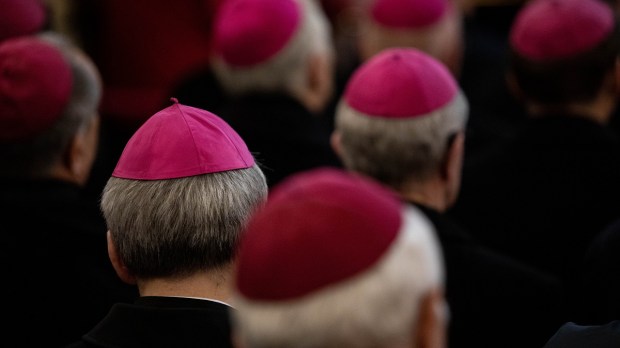Every day, Aleteia offers a selection of articles written by the international press about the Church and the major issues that concern Catholics around the world. The opinions and views expressed in these articles are not those of the editors.
Wednesday 16 November 2022
1. Is the episcopal dimension of the Church in danger?
2. Bishop comments on the ad limina visit of the Dutch Bishops
3. Bishop Broglio, a conservative figure at the head of the American bishops
4. Churches in Lebanon: a president is needed “immediately”
5. Bahrain: Pope’s request for amnesty falls on deaf ears for now
Italian historian Massimo Faggioli, a university professor in the United States, explains that the Catholic Church is becoming “post-episcopal.” “The situation arises from the precipitous drop in vocations. We still have bishops, priests, and deacons, of course, but there’s no way to imagine a Church in which there’s a priest for every parish,” he explains, noting an important drop in the level of trust that priests have for their bishops. “The post-conciliar crisis of the priesthood and religious orders is not surprising, given the perfunctory treatment Vatican II and its final documents gave to those ministries and their role in the Church,” contends Faggioli. However, the crisis of the episcopate is more complex to analyze. The revaluation of the episcopal body by the Council, especially through the promotion of episcopal collegiality, has not had the desired effect. The academic highlights the palpable malaise of “the high number of priests who are chosen to become bishops but who decline the appointment; the number of bishops resigning because of burnout” and “the cases of bishops quietly removed (and without any transparency, especially for the victims) by the Vatican over accusations or for being found guilty of abuse or cover-up.” In this context, synodality acknowledges the progressive erasure of the bishop as the pivot of the Church’s government. The Synod of Bishops, created by Paul VI in 1965, is changing its name simply to “Synod” (not “of bishops”) and synodality is called to become a model of shared governance in ecclesial bodies, involving especially the laity and women. “It’s meant to fill the vacuum left by the bishops, a vacuum into which other voices and entities—in media, in business, in politics—have rushed, and in so doing have put the catholicity of the Church at risk,” claims Faggioli.
Commonweal, English
2Bishop comments on the ad limina visit of the Dutch Bishops
“The Roman Curia, the set of departments that assist the Pope in the administration of the Church, is at the service of the bishops, not above us,” Bishop Gerard de Korte of the Diocese of ‘s-Hertogenbosch told the Christian daily Nederlands Dagblad. The Bishop, who has just returned from the week-long ad limina visit, sees this as a “clear sign of a growing synodality” driven by the Pontiff. The Pope, who met with all the Dutch bishops, stressed the importance of pastoral accompaniment in their ministry and of continuing with the synod. The synod, he told them, is a spiritual process with a “parliamentary dimension” but not a parliament. He invited them to listen to each other but also to take time for silence during the synod sessions. De Korte also spoke about the fact that Radboud University in the city of Nijmegen will be seen as Catholic again, after a dispute with the Dutch Bishops. This reconciliation, which is being promoted by the Holy See, will involve the creation of a Laudato si’ institute.
Nederlands Dagblad, Dutch
3. Bishop Broglio, a conservative figure at the head of the American bishops
Archbishop Timothy Broglio was elected president of the U.S. Bishops’ Conference on November 15. A former secretary to Cardinal Sodano in the 1990s, he has been Archbishop of the U.S. armed forces for nearly 15 years. Archbishop Broglio is one of several American prelates who have criticized President Joe Biden for his stance on abortion.
La Croix, French
4. Churches in Lebanon: A president is needed “immediately”
Church leaders in Lebanon have met in recent days and urged the parliament to elect a president, after the departure of Michel Aoun. On Sunday, the Maronite patriarch also called for an international conference for the country, reports Terre Sainte magazine.
Terre Sainte, French
5. Bahrain: Pope’s request for amnesty falls on deaf ears for now
Pope Francis’ personal appeal to the King of Bahrain during his recent trip to the Gulf, pleading for the release of a number of political prisoners jailed since 2011, all of whom belong to the Shiite current of Islam, has so far had no effect. King Khalifa has not acceded to the papal request, despite expectations.
Il Messaggero, Italian

